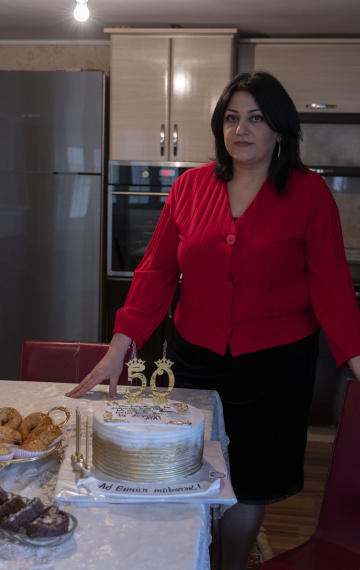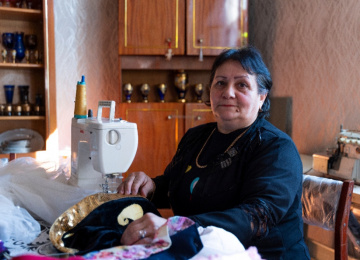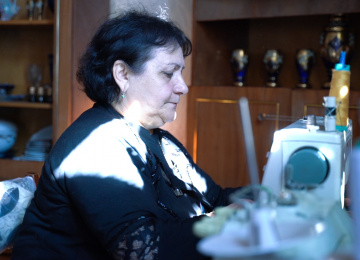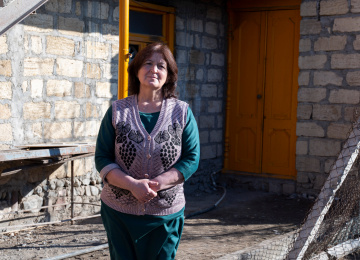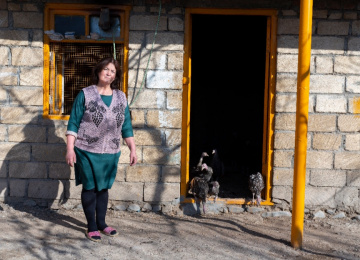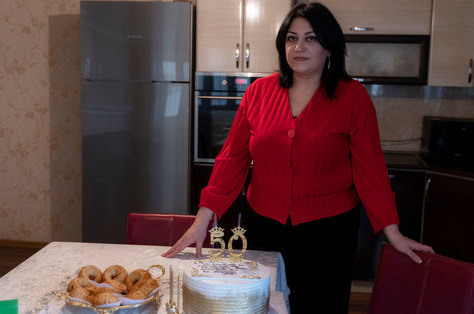
More and more women in Azerbaijan are interested in entrepreneurship. But often they don’t have the resources, knowledge or financial support necessary to turn their ideas into reality, or to expand an existing business. Here are some stories about women who were able to pursue their dreams with help from the EU-funded program called “Accelerating development of sustainable micro-entrepreneurship in rural regions of Azerbaijan” or ADSMIRRA.
From A to Z: A tailor learns to spend wisely and grow her business
A tailor in Ganja, the second largest city of Azerbaijan, Elza Rzayeva has been engaged in her favourite work for some 14 years. Her constant goal is to create outfits that make people more attractive as a master of her craft. Rzayeva not only approaches each commission creatively, but she also helps her students develop this quality. Most of them have received job offers and some have even launched their own businesses.
Ganja citizens of different age groups come to Rzayeva’s atelier for the new dresses and she has many satisfied, happy customers. The outfits she sews are intended to delight their wearers for a long time. She also knows that this is what will make them come back again and again.
Artistic flair and hard work have made Rzayeva an experienced professional tailor in her hometown. At the same time, she has always looked for ways to expand her business and acquire quality materials as well as her dream sewing machine. An EU-funded program ADSMIRRA helped Rzayeva do exactly that.
“The local vocational school told us about the project,” recalls Rzayeva. “My students and I decided to join it. I have to say that we really learned a lot in the process, about income sources, managing expenses, how to build a business, and how to spend the money wisely.”
After completing the ADSMIRRA workshops, Rzayeva and others were eligible for grant support. “With the funding, we bought the necessary equipment and materials for our business,” says the Ganja tailor.
The new computerized sewing machine can perform many complex stitches, making a sewer’s work better and easier. As it turned out, the pandemic did not have a negative impact on Elza Rzayeva’s business. On the contrary, her customer base has nearly doubled. So now she’s working on some new big plans for the future.
Tovuz teacher turned cake-maker buys equipment to expand customer base
Shafag Aliyeva is a cake-maker in Tovuz County in Azerbaijan. In a short period of time, her cakes became very popular in the town of Govlar. Aliyeva's hand-made designs decorated the tables at every family event. Trained as a teacher, she can now claim two professions. Each is important to her in its own way.
In order to grow her cake business, however, Aliyeva began to look for new opportunities. Through workshops provided by the EU-funded ADSMIRRA program, she was able to expand her knowledge how to run a business. The project also made it possible for her to buy new equipment and expand her business. Aliyeva says this new equipment is helping her to attract more customers.
“I may be a teacher by training, but I have found myself in this business,” admits Aliyeva. “I’m very passionate about it and I’m thrilled that I qualified to receive a grant. This project has played a vital role in my life. First, it introduced participants to many people. Then, we gained new knowledge and skills. And finally, the money allowed us to buy new equipment and do our job better.”
New device helps to woman farmer develop Samukh poultry business
Year after year, new industrial enterprises are opening in Samukh County in Azerbaijan. Along with them, local farming is developing. Today, poultry is among the priorities for regional development in this part of the country. This is generating opportunities for small enterprises.
One of the most successful in Samukh County is a business established by Turkan Asadova in the village of Sarkar to expand poultry farms in the area. Asadova started her own business with the support of the ADSMIRRA project, through which she met entrepreneurs working in different areas. At present, an incubating device installed in her yard makes it possible for up to 16,000 eggs to be laid at the same time. According to Asadova, the eggs hatch after 21-22 days in the apparatus.
“In addition to joining this project, I also participated in several workshops where we learned about business development and how to succeed in business,” Asadova explains. “We also learned that our business needs to benefit others, as well. Thanks to a generous grant, we were able to buy this new incubator, which allows us to produce around 16,000 eggs and chicks.”
Summing things up, Asadova says: “We were told in simple terms how to expand our business. We did our best and finally won a grant.” As a result, the villagers gain a large quantity of products. Now Asadova's business is doing well and her income is growing day by day.
The EU-funded ADSMIRRA project is ongoing in Azerbaijan. Its aim is strengthening the potential of micro and small entrepreneurs in rural areas by providing workshops on financial literacy and business planning. The project has already supported the launch of 37 start-ups, the expansion of 76 micro businesses and generated 125 jobs in rural Azerbaijan.

